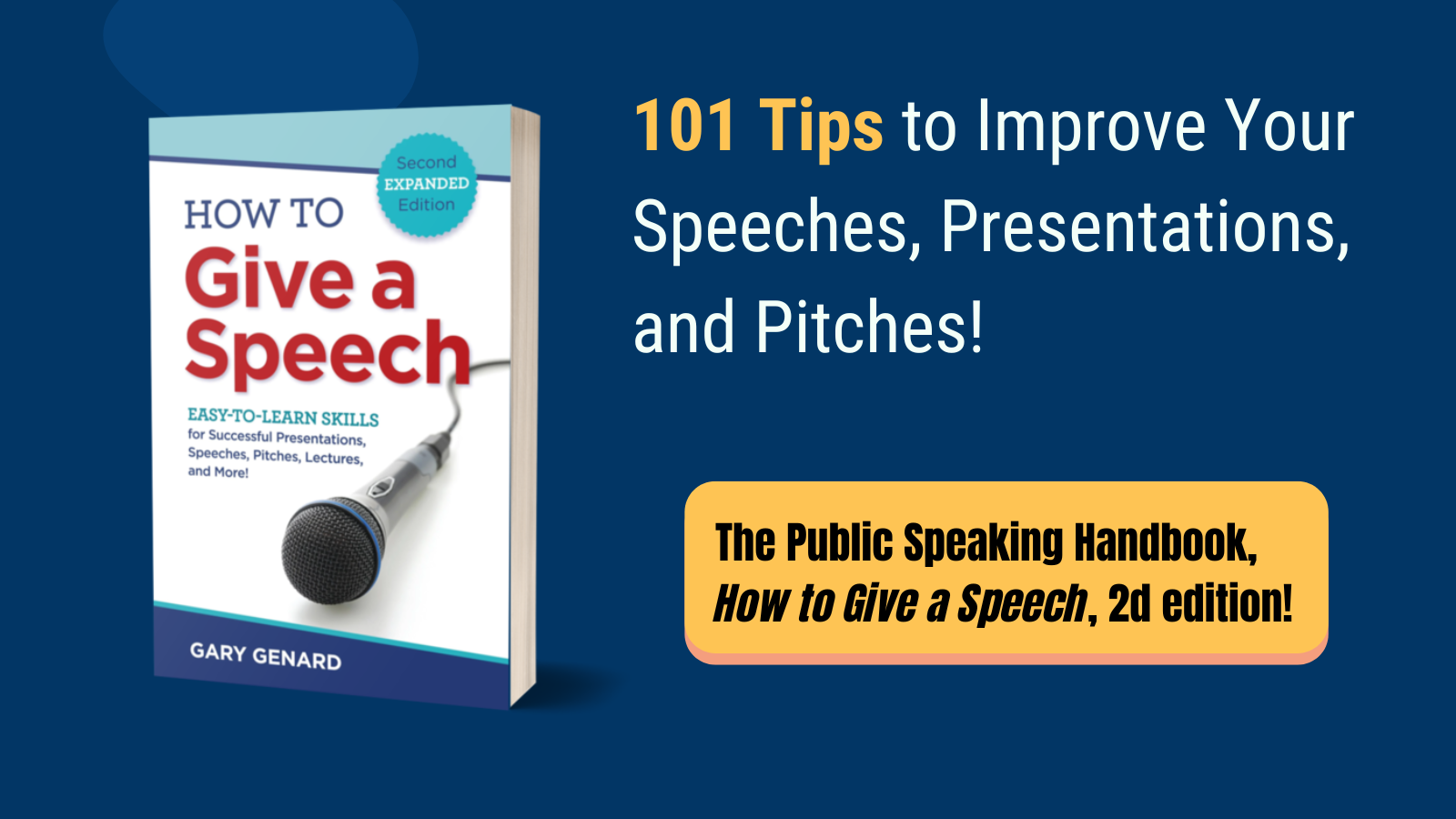Want to take your speech's content and shape it into an impactful whole? Here's how to prepare like a pro with my essential presentation checklist.
You're as important as the content in every speech you give.
That's an important reason why there is a speech in the first place. It should also be a reassuring one, reminding you of what your true value is to an audience. You might soar or stumble on any given day (we all do both). But ultimately, it's who you are and your professionalism that makes us want to hear what you have to say.
So it makes perfect sense that you should prepare the smart way. That has less to do with cramming data into your head than getting the practical, here's-how-it's-done tasks right.
You'll find more on this in Chapter 15, "Nuts & Bolts: Practical Skills for Presenters," in my book, How to Give a Speech. Click on the image below for a Free Chapter! On Amazon.
For one thing, that means engaging your audience right away. Find out how in my Free cheat sheet, "How To Start A Speech: 12 Foolproof Ways To Grab Your Audience."
Taking A Practical, Performance-Based Approach
The nuts-and-bolts preparation you do beforehand is what will ensure your eventual success. Here are three pieces of practical advice for getting ready with your speech, presentation, pitch, lecture, demonstration, or remarks.
There’s one bit of wisdom I’d like to share with you first, though. It’s the best advice I know of for becoming a more accomplished presenter: acquire as much speaking experience as possible.
Take every opportunity to speak in public—even if that’s a nerve-racking proposition for you. It’s the best way to gain control over your fear, and to reach that state of mind in which speaking in front of others is both a pleasurable and productive activity for you.
If speech anxiety is a problem for you, take a look at my book, Fearless Speaking, named in 2019 as "One Of The 100 Best Confidence Books Of All Time." Get a signed copy here!
Now, the practical advice:
- Prepare solid briefing materials. Take a page from diplomats and other public affairs types and put together a briefing book. Ask yourself the following questions as you compile your information:
- Are my materials memorable (for me)?
- Have I anticipated questions and objections, so I know how to survive Q & A?
- Does each of my main points “headline” the information to come?
- Is my information well laid out and visually highlighted for my benefit?
- Is it "stupid enough?" Will it make sense to every listener, no matter their level of sophistication?
- Plan your practice sessions. A good strategy for your practice sessions is vital. It can be just as helpful as knowing how to use positive visualization to ensure a successful presentation. Here’s how to go about it:
- Timing: Begin sooner rather than later. Give yourself sufficient time!
- Emphasis: Be clear on what you’re focusing on at each practice session, and make that the sole purpose. For instance, are you working now on your content? The logic and language? How your narrative works alongside the visual components? At your last rehearsal, it can and should all come together.
- Setting: Go from rough-and-ready settings to as close an approximation as you can of the real situation, venue, and audience. Make every effort to do a run-through in the actual setting, or if that isn't possible, at least walk the stage when there's no audience.
- Post-performance feedback: Define for yourself what you’ll consider a success. Let subordinates and colleagues know that you expect and welcome criticism.
- Rehearse 3-5 times: Less than three times is almost winging it. If you rehearse more than 5 times, you’ll run the risk of a) becoming stale, and b) memorizing movements and repeating them so that they look mechanical.
- Have an out-of-body-experience. Videotape yourself, or do an audio recording if you'll be speaking on radio, a webinar, or a podcast. (And here's my Free Guide, "Essential Speaking Tips for Video Conferences.") Pay close attention and work on the rough spots. You need to hear and see yourself as others experience you. The modern miracle of digital video and audio equipment allows you to do that. Make use of it!
Like historical thrillers? — Discover my Dr. William Scarlet Mystery Series!
London, 1888. 'Jack the Ripper' is terrorizing London. Who is he? Scotland Yard surgeon/ psychic Dr. William Scarlet is about to find out! Year of the Rippers: A Supernatural Thriller.
You should follow me on Twitter/X here.

Gary Genard is an actor, author, and expert in public speaking and overcoming speaking fear. His company, The Genard Method offers live 1:1 Zoom executive coaching and corporate group training worldwide. He was named for nine consecutive years as One of the World’s Top 30 Communication Professionals, and also named as One of America's Top 5 Speech Coaches. He is the author of the Amazon Best-Sellers How to Give a Speech and Speak for Leadership: An Executive Speech Coach's Secrets for Developing Leadership Presence. His book, Fearless Speaking, was named in 2019 as "One of the 100 Best Confidence Books of All Time." He is also the author of the Dr. William Scarlet Mysteries. Contact Gary here.
Main photo credit: Marcus Aurelius on pexels.com






